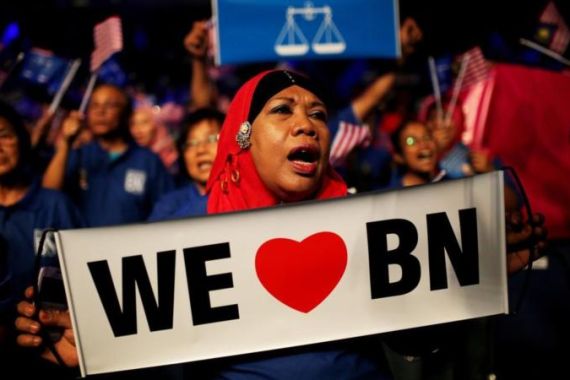Choosing between past and future in Malaysia’s election
The opposition stands a chance of winning, despite concerns over voting process and big handouts by ruling coalition.

Malaysia will head to the polls on May 5 for arguably the most competitive election in the country’s history. The choice is stark: voters must choose between Barisan Nasional, an incumbent coalition that has been in power longer than any other coalition in the world, and Pakatan Rakyat – a more youthful opposition that has experience governing at the state level but still faces an upward climb to build trust.
The contest will fill 222 parliamentary seats in 12 states. (The 13th state, Sarawak, held its state polls in 2011.) The overwhelming majority of parliamentary seats will be close fights, with the balance of power in more than half of the states up for grabs. This underscores the reality that the incumbent coalition is facing the most serious challenge to its position in history.
But serious questions have been raised about the legitimacy of the electoral process: the veracity of the electoral roll, the mass use of vote buying, and the fact that thousands of early voters have been non-transparently registered in different constituencies. Since 2009, the government has spent an estimated 57.7bn ringgit ($18.68bn) on election-related incentives, which comes out to about $1,400 per voter – the most expensive in its history. Concerns are also being raised that Barisan Nasional will use their control of the electoral administration to their advantage and deny Malaysia a fair vote.
Nevertheless, the opposition stands a chance of winning. There are three major issues in this campaign, each of which could favour Pakatan Rakyat. The first involves governance. Prime Minister Najib Razak has repeatedly highlighted his economic credentials, touting his Economic Transformation Programme as a success. Until recently, Najib has worked to build a sound reputation in economic management.
But critics have complained about excessive spending, increasing dependence on oil revenues and a failure to attract private investment and bring about much-needed policy reform.
Even more seriously, corruption continues to hamper economic growth and discredit the governing coalition, with Malaysia topping Transparency International’s global 2012 Bribe Payers Survey. According to the financial watchdog, Global Financial Integrity, Malaysia had the second-largest amount of illegal capital flight in the world at $64bn in its latest study in 2010.
The second major issue in this campaign involves leadership. The incumbent government has centred its campaign around the premier: a vote for Barisan Nasional is portrayed as a vote for Najib. Advertisements for the party have focused primarily on Najib, who is projected as a caring, successful and reformist leader. The opposition has aimed to show that in the four years of Najib’s tenure he has failed to substantively reform the economy and the country’s political institutions.
Yet Najib is popular – in part due to the financial goodies he has doled out and his reputation for being a more capable manager than former prime minister Abdullah Badawi. The opposition leader, Anwar Ibrahim, must deal with the government’s constant demonisation and charges of sexual immorality.
Though Anwar was acquitted of the trumped-up charges of sodomy filed against him, the government has filed an appeal to continue the case. While popular among his base supporters, Anwar must overcome a trust deficit in order to win power, which stems largely from his role in Mahathir Mohamad’s administration and the effectiveness of the smear campaign led by the state-controlled media.
The third issue is representation. Since the last election in 2008, Barisan Nasional is no longer a genuinely multi-ethnic coalition, losing significant ground among non-Malays. The coalition is fighting to hold onto non-Malay support with non-Malay component parties that have been delegitimised. Many of these parties are not even fielding their leaders in the election as they cannot find secure seats to run them in.
For the opposition, the challenge is the opposite: Pakatan Rakyat must show that it can work together in its diversity. The coalition is more inclusive and multi-ethnic than Barisan Nasional, but its differences often lead to open disagreement and concerns about its ability to govern. These differences are frequently exaggerated, but the challenge of managing differences while protecting rights in Malaysia is real and requires inclusive dialogue.
The question of representation is not just about ethnicity, it is also about class interests. The ruling elite, which have long controlled Malaysia’s resources, are fighting hard because they know this election is about ending their unlimited abuse of the system. The elite have used cash handouts to the lower classes to hold onto power, hoping that these incentives will keep their positions secure. The opposition has followed a populist line and pushed for greater equality. They opposition however aims to review the monopoly licensing arrangements in the economy. This is feared by those who are economically vested in the status quo.
In this context, Malaysians face perhaps the most significant electoral choice they have ever experienced in their history. Najib is unlikely to survive unless he gains more seats. Though the advantage lies with Barisan Nasional and its 56 years in office, the issues at stake give the opposition a fighting chance. The forces for democratic change are gaining ground. The question of whether to stick with the old or opt for a new future is at the heart of Malaysia’s upcoming polls, with greater democracy in the balance.
Bridget Welsh is an associate professor of political science at Singapore Management University.
